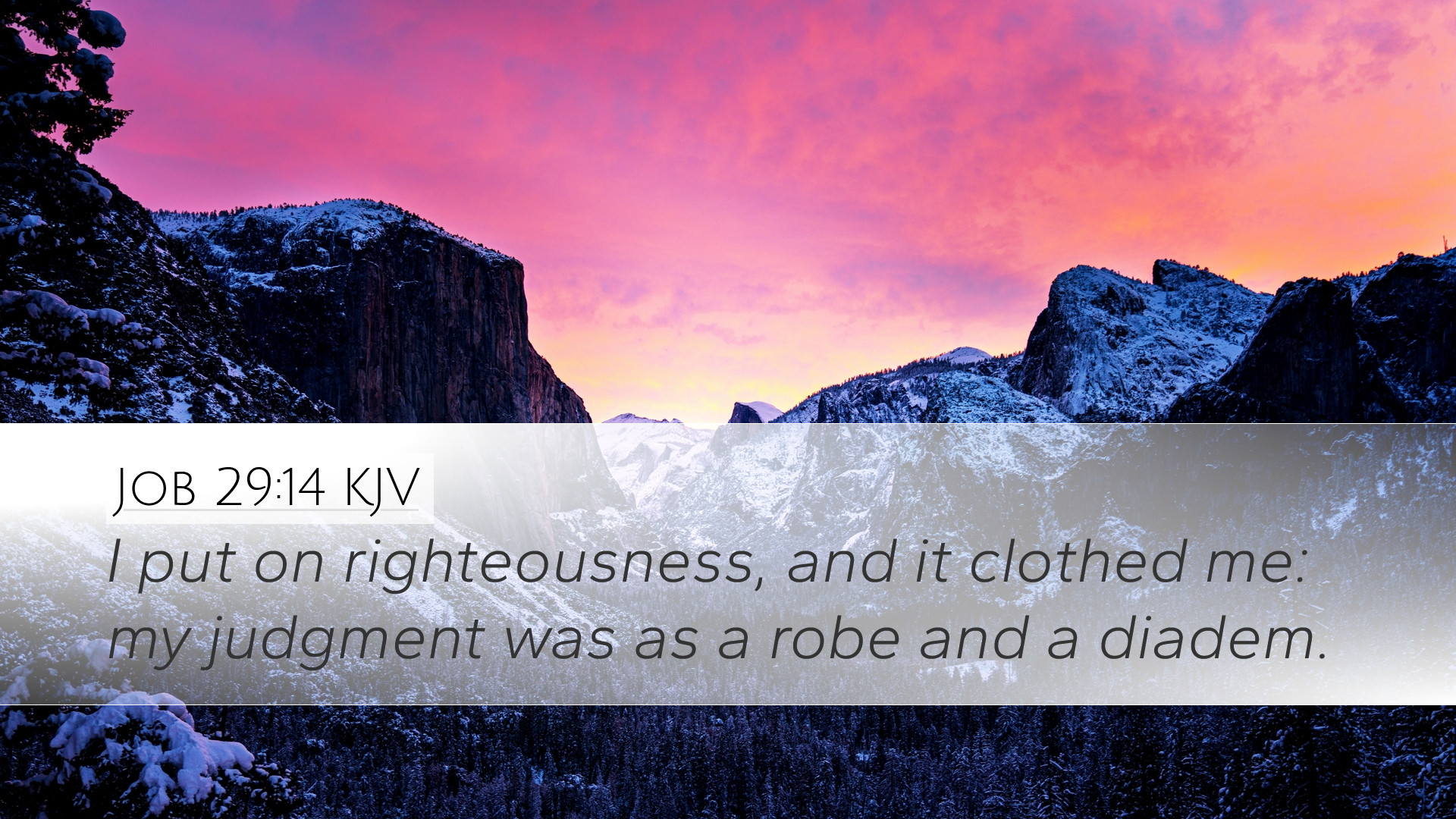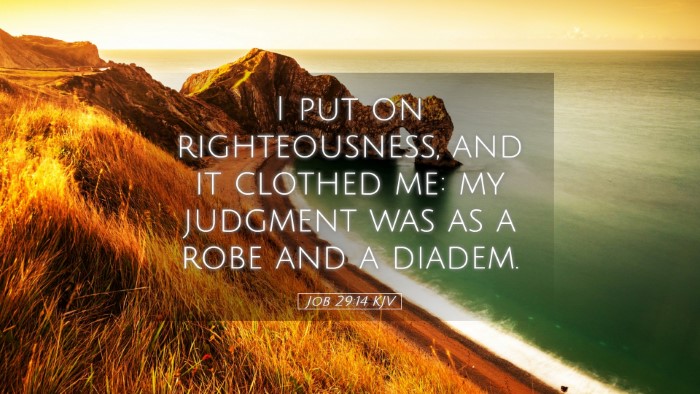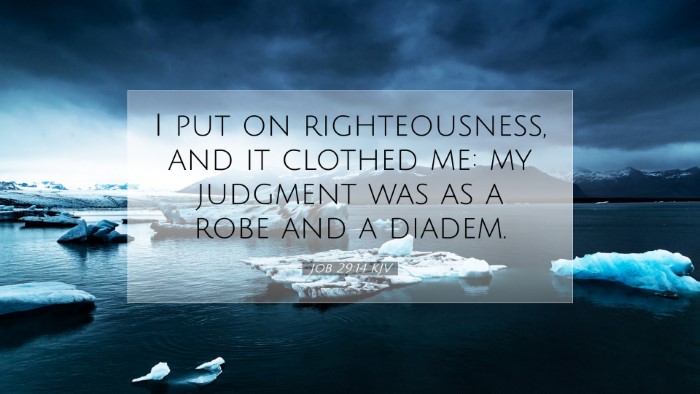Old Testament
Genesis Exodus Leviticus Numbers Deuteronomy Joshua Judges Ruth 1 Samuel 2 Samuel 1 Kings 2 Kings 1 Chronicles 2 Chronicles Ezra Nehemiah Esther Job Psalms Proverbs Ecclesiastes Song of Solomon Isaiah Jeremiah Lamentations Ezekiel Daniel Hosea Joel Amos Obadiah Jonah Micah Nahum Habakkuk Zephaniah Haggai Zechariah MalachiJob 29:14
Job 29:14 KJV
I put on righteousness, and it clothed me: my judgment was as a robe and a diadem.
Job 29:14 Bible Commentary
Commentary on Job 29:14
Job 29:14 states, "I put on righteousness, and it clothed me: my judgment was as a robe and a diadem." This verse encapsulates Job's remembrance of his former integrity and the esteem in which he held righteousness during his prosperous days.
Contextual Overview
To fully appreciate Job 29:14, it is essential to consider the context of Job's life. After experiencing immense suffering and loss, Job reflects on his past, sharing his memories of integrity and righteousness. This verse stands as a poignant contrast to his current state of despair and humiliation.
Insights from Matthew Henry
Matthew Henry emphasizes the metaphor in Job's expression of righteousness. He notes that Job “put on” righteousness like a garment, illustrating the completeness and the naturalness of living a life aligned with God’s will. Righteousness is not merely an accessory but the very essence that clothed him. This clothing is indicative of protection and honor, similar to a king's robe.
- Righteousness as a Garment: Henry describes righteousness as a garment that provides both dignity and distinction. It is akin to the robes worn by kings, representing authority and nobility.
- Judgment as a Diadem: The translation of "judgment" as a diadem denotes the crown of wisdom and understanding. This suggests that Job's judgment was both godly and wise, leading to favorable and fair decisions.
Albert Barnes' Analysis
Albert Barnes provides a detailed commentary, focusing on the implications of Job’s reflections. He asserts that Job's assertion of righteousness serves to highlight the excellence of living in a just manner.
- The Essence of Righteousness: Barnes highlights that to “put on righteousness” indicates an active choice to embody virtue. Job did not passively receive righteousness; instead, he actively engaged with it, making it part of his identity.
- Symbol of Authority: By likening his judgment to a diadem, Barnes emphasizes that wisdom and justice grant one a certain authority. Job exemplified the principle that righteous behavior leads to respected authority within a community.
Adam Clarke's Commentary
Adam Clarke delves into the linguistic nuances of Job 29:14, focusing on the term "judgment." Clarke discusses how Job's claim is reflective of a moral and ethical stature that results from consistently applying righteousness.
- Clothing of Integrity: Clarke posits that the metaphor of clothing suggests a covering and protection that righteousness affords a person, creating a clear image of integrity enveloping Job.
- The Regal Aspect of Righteousness: Clarke emphasizes the dual nature of judgment as protective and dignifying, asserting that it serves as a crown, consequently indicating that righteousness and just judgment elevate one's standing before God and man.
Theological Implications
The verse invokes deep theological reflections on the nature of righteousness and its implications in the life of a believer. It challenges theological discourse around the idea of merit and divine favor, suggesting that righteousness is inherently linked to one's relationship with God.
- The Nature of True Righteousness: Righteousness should not merely be an external facade but must arise from an authentic heart posture towards God.
- Community and Ethical Living: Job's reflection prompts readers to consider how their own judgments and conduct reflect their commitment to living righteously within their communities.
Practical Applications for Pastors and Scholars
For pastors and scholars, Job 29:14 serves as a foundational text for discussing the character of God, the importance of integrity, and the implications of living a life that mirrors Christ's righteousness. It serves as a reminder that true authority and respect are birthed from a life reflecting God's justice and love.
- Encouragement for Others: Pastors may find in this text opportunities to encourage congregants who are facing trials to look back on God's past faithfulness and cultivate a life of righteousness.
- Biblical Ethics: The commentary can stimulate discussions around ethics, particularly in how the church responds to societal injustices today.
Conclusion
In summary, Job 29:14 provides both a profound reflection of Job's integrity and a powerful reminder of the significance of righteousness in life. The collective insights from Matthew Henry, Albert Barnes, and Adam Clarke illuminate the depth of this verse, urging believers to embrace righteousness as an integral aspect of their spiritual identity. As the body of Christ, reflecting this righteousness impacts not only individual lives but the broader community as well.


